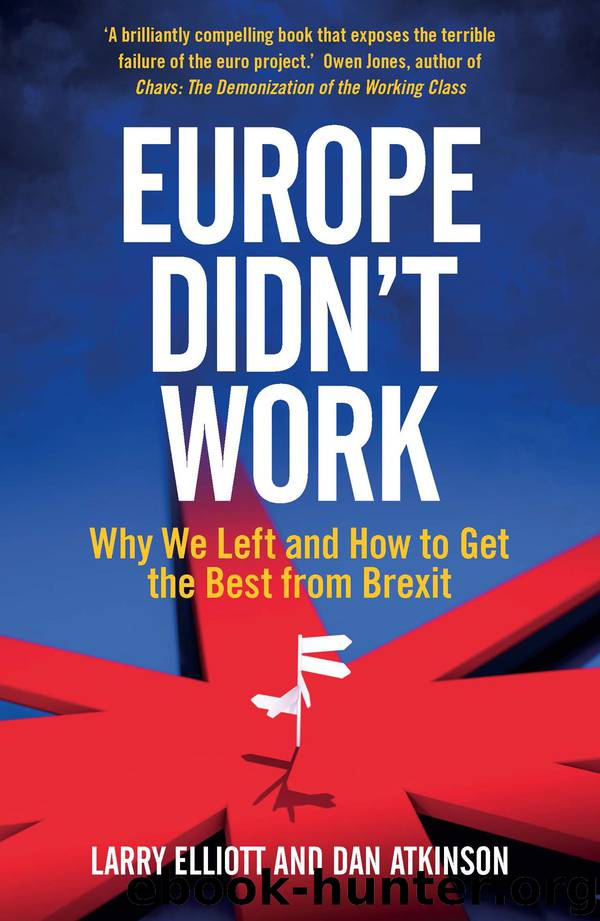Europe Didn't Work by Larry Elliott

Author:Larry Elliott
Language: eng
Format: epub
ISBN: 9780300228793
Publisher: Yale University Press
CHAPTER 7
THE SISYPHUS EFFECT
Greece’s tormented euro-odyssey
Alexis: ‘You’ve got everything except one thing: madness! A man needs a little madness, or else …’
Basil: ‘Or else?’
Alexis: ‘… he never dares cut the rope and be free.’
Zorba the Greek
To the Greek people, 2016 looked likely to prove another Unhappy New Year. More than five years into a seemingly interminable crisis, the country’s woes showed no sign of coming to an end.
On 14 January, Gerry Rice, director of the International Monetary Fund’s Communications Department, told a press conference: ‘Greece’s pension system is unaffordable. As it stands the contributions are not sufficient to finance the generous level of benefits requiring transfers of the state of close to 10 per cent of GDP each year.’ For good measure, he added ‘the vulnerable banking sector [and] the structural impediments to growth’ to Greece’s list of woes.1
The previous month, Prime Minister Alexis Tsipras had insisted that the IMF should keep out of Greece’s affairs, and that the country’s third bailout since 2010 could be handled entirely within the Eurozone. Perhaps ironically, this chimed with the critics of the Fund’s involvement with previous bailouts, on the grounds that the IMF ought not to be lending to developed economies within the European Union. ‘By any standards, the entanglement with the Eurozone crisis is a whopper of a screw-up,’ declared Jeremy Warner in the Daily Telegraph, adding that ‘heads must roll’. Nor was there any doubt as to whose head should be first on the chopping block: ‘If this were any normal organization, the IMF’s managing director, Christine Lagarde, would be forced to resign and someone with less of a vested interest in propping up the folie de grandeur of European monetary union installed in her place.’2
At his press conference, Gerry Rice was confronted with Mr Tsipras’s reluctance to countenance IMF involvement in the third bailout. To the question, ‘The prime minister and his ministers ask you many times to leave Greece and the Greek problem. Why do you insist to stay?’ Rice replied: ‘Maybe just as a first order of business. Just to remind you, Greece has requested a programme from the IMF.’
Indeed it had. Having perhaps remembered this, the Greek government executed a swift U-turn. The following day’s edition of the London financial paper City AM reported that Jeroen Dijsselbloem, the Dutch finance minister who doubled as president of the Eurogroup of Eurozone finance ministers, had spoken to his Greek opposite number Euclid Tsakalotos who ‘confirmed to me that the Greek government accepts that the IMF needs to be part of the process’.3
To someone returning to Earth after a twelve-month space voyage, this may have seemed a monumental cave-in of the sort that prompts ministerial resignations and puts a question mark over the future of governments. But after a year of Mr Tsipras’s prime ministership, this was pretty much par for the course. Outright defiance of the country’s creditors and EU partners followed by acquiescence followed in turn by another ‘last stand’ had become something of a pattern since Mr Tsipras had taken office on 26 January 2015.
Download
This site does not store any files on its server. We only index and link to content provided by other sites. Please contact the content providers to delete copyright contents if any and email us, we'll remove relevant links or contents immediately.
International Integration of the Brazilian Economy by Elias C. Grivoyannis(57419)
The Art of Coaching by Elena Aguilar(50141)
Flexible Working by Dale Gemma;(22956)
How to Stop Living Paycheck to Paycheck by Avery Breyer(19223)
The Acquirer's Multiple: How the Billionaire Contrarians of Deep Value Beat the Market by Tobias Carlisle(11684)
The Radium Girls by Kate Moore(10929)
Thinking, Fast and Slow by Kahneman Daniel(10640)
The Art of Thinking Clearly by Rolf Dobelli(8878)
Hit Refresh by Satya Nadella(8347)
The Compound Effect by Darren Hardy(7586)
Atomic Habits: Tiny Changes, Remarkable Results by James Clear(7244)
Turbulence by E. J. Noyes(7062)
Tools of Titans by Timothy Ferriss(6977)
How to Be a Bawse: A Guide to Conquering Life by Lilly Singh(6708)
Change Your Questions, Change Your Life by Marilee Adams(6668)
Nudge - Improving Decisions about Health, Wealth, and Happiness by Thaler Sunstein(6647)
Win Bigly by Scott Adams(6330)
The Black Swan by Nassim Nicholas Taleb(6213)
A Court of Wings and Ruin by Sarah J. Maas(6125)
